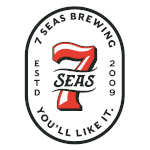If this were happening in Washington or Oregon, we would be freaking out. Just because it’s happening 3,000 miles away in Tallahassee, Florida does not mean we should ignore what’s going on. Our craft beer brothers and sisters in the Sunshine State need our support. Moral support, if nothing else.
A controversial bill in the Florida legislature recently passed Senate committee and is expected to see a vote soon. Perhaps as early as today. When originally conceived, SB 1714 aimed to legalize 64-ounce growler fills at breweries, something currently prohibited in Florida. For some odd reason, 32-ounce and 128-ounce growlers are legal, just not the typical 64-ounce variety. This bill was intended to address that little oddity. Simple enough, right?
Then some power players got involved and the bill soon included serious negative implications for craft brewers. To some, the bill now seems a thinly veiled attempt to harm craft breweries. Some people accuse certain senators of serving the interests of the mega-breweries and their distributors. By all outward appearances, it does indeed seem that a bill intended to benefit craft breweries mysteriously morphed into a bill that attacks craft breweries.
In very general terms, the bill (SB 1714) would prohibit a brewery that produces more than 1,000 barrels (2,000 kegs) of beer per year from selling their products in bottles or cans at its own brewery. Instead, a craft brewery would be required to sell its beer to a distributor and buy it back at a marked-up price before selling it at its own brewery. A boom for distributors, a bust for craft breweries. It’s been amended slightly but the threat has not been mitigated.
Yes, somewhere in there, the bill promises to legalize growler fills, as was originally intended. Read the bill here
The latest round of amendments, which Senator Kelli Stargel introduced recently, changes things a bit and is supposed to ease the worries of craft breweries. The amended bill would authorize small breweries (under 1,000 barrels of production per year) to sell all of their beer either by draft, growler, or bottles/cans directly to consumers. Also, the amendment authorizes breweries to sell up to 20 percent of their annual on-site production in sealed containers to go. In addition, a consumer can buy up to one keg per day from the brewery.
That sounds good, but the Florida Brewers Guild isn’t falling for it. Without going into details, even in its amended form the bill is rife with language that benefits distributors. In addition to the aforementioned restrictions, it also introduces new laws with punitive repercussions that seem to target craft breweries.
The Florida Brewers Guild, which represents the interests of the state’s craft breweries, released the following statement on its Facebook page yesterday:
“Senator Stargel threw us under the bus today folks. We still have time to pull this out but she’s determined to put restrictions on how we operate and hinder our growth. What does this mean to you? Less beer, higher prices, less job creation, fewer breweries, etc. Senator Stargel and Senator Gaetz are determined to over-regulate us to the point we can hardly operate. Why? Greed. It’s an ugly thing.”
 If that language seems strong, consider what Joey Redner has to say about this bill. The founder of what is perhaps the state’s best-recognized brewery, Cigar City Brewing in Tampa, has gone on record, telling the Tampa Bay Time that if the bill becomes law he needs to strongly consider moving his brewery out of state. Actually, he suggested that the current political climate in Florida might be too uncertain to continue operating there.
If that language seems strong, consider what Joey Redner has to say about this bill. The founder of what is perhaps the state’s best-recognized brewery, Cigar City Brewing in Tampa, has gone on record, telling the Tampa Bay Time that if the bill becomes law he needs to strongly consider moving his brewery out of state. Actually, he suggested that the current political climate in Florida might be too uncertain to continue operating there.
Redner recently told the Tampa Bay Times, “If I went out of state, I could build a brewery and still have close proximity to my markets, but I would have a revenue stream that makes me more competitive. I would be stupid not to consider it. Not knowing the legislative climate, it’s going to be hard to make a decision and commit to a multimillion-dollar expansion.”
Existing Florida law does not allow for self-distribution. Breweries cannot sell directly to bars and other retailers, but can sell their own prepackaged products at their own breweries. Cigar City Brewing’s found told the Tampa Bay Times that his brewery sells about $900.000 worth of beer direct to consumers each year and stands to lose $300,000 per year if the bill becomes law. Much of the beer sold at the brewery are specialty beers not available at bars and other locations. That is, presumably, beer not intended to enter the regular distribution chain.
Looking for a local angle? Something familiar with which you can compare this? Imagine if a new law required Fremont Brewing to shut down the Urban Beer Garden. Ask Georgetown Brewing (blog sponsor) how it would be impacted if they could no longer sell growlers to go. There are plenty of other examples. Devastating. That’s not intended as a direct correlation, but the impact is comparable.
Cigar City, which brews about 50,000 barrels per year, is on a growth trajectory that will very likely require a major expansion in the near future. In fact, such expansion is all but certain. If the bill passes, Florida may not reap the benefits of Cigar City’s expansion. The company would quite likely take its growing business and new jobs to another state.
Why would Florida’s lawmakers risk that? Why are legislators (mostly Republican) bent on attacking craft breweries? Who could possibly be influencing their decisions?
Lawmakers who support the amended version of the bill and its negative impact on craft breweries claim that it is all about maintaining the three-tier distribution system. That is not much different than saying that they are doing it “for the children.”
It seems reasonable to assume that other craft breweries share Joey Redner’s concerns. Any breweries-in-planning in Florida are likely holding their breath (and their wallets) before moving forward.
If you happen to live in Florida and this is all news to you, get your head out from under that rock. You should read more about this issue and make your opinion know. Contact your local legislator. I’m not sure how much we non-residents can do to affect the process. One thing is for sure, the craft beer industry in Florida has our sympathy and our support. Fight the good fight!
Go to the Florida Brewers Guild’s Facebook page and like it. Strength in numbers.


































From what I’ve been reading 32oz and 128oz (gallon) fills are currently legal. The camel’s nose got under the tent when the distributor’s lobby got the bill to permit 64oz growler fills amended.
Yep. The whole thing stinks. Dirty business. I encourage people who want to learn more to simply do a google news search for SB 1714. There’s a lot out there.
I’m not surprised by this development in FL at all. As a founder of the Florida Brewers Guild back in the mid 90’s our original fight in Tallahassee was to get the bottle size law changed–8, 12, 16 or 32 ounces were the only legal sizes so no 22oz “bombers” nor anything from Belgium in a 750ml (approx 26 oz) were available. I used to have to go to the ATL to get Chimay if you can believe that. The first time it went to Tallahassee it was rejected because “all the retailers will have to get new shelving due to the odd sizes of the bottles” and the next year rejected again because “all the college kids will be drunken reprobates due to the high alcohol beers”. Rubbish indeed. The law thankfully was repealed about 10 years back but that whole state is owned by AB and the distributors will always just follow their lead.